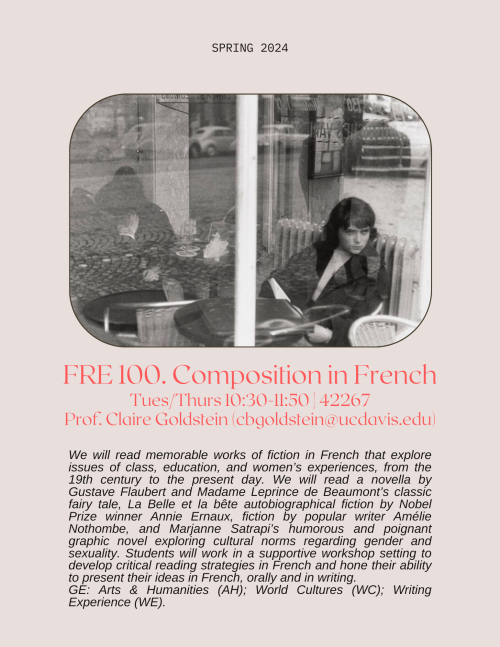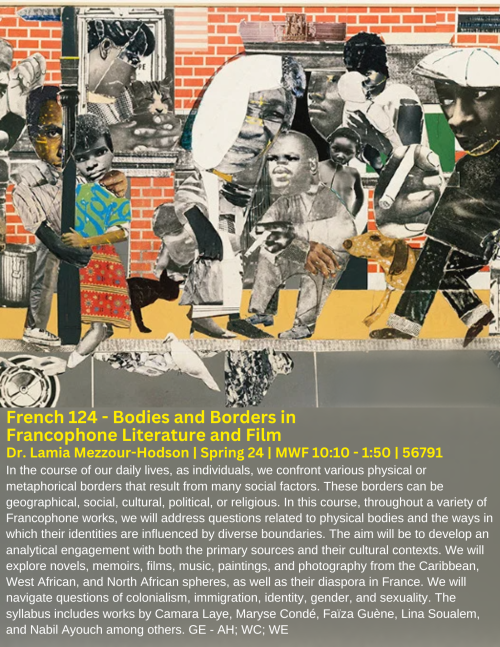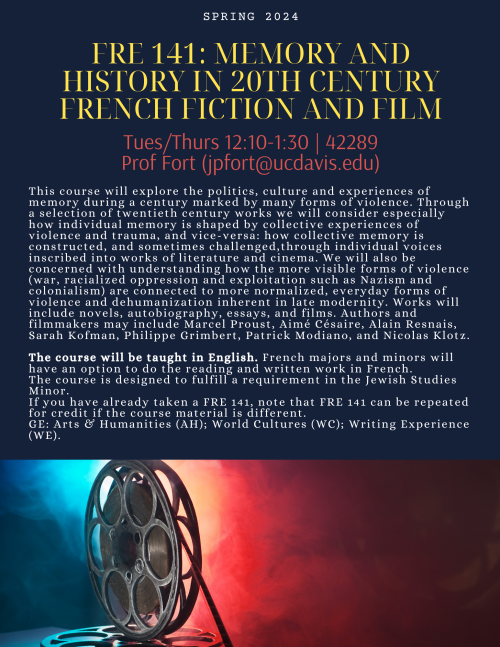Spring Quarter 2024
- For day, time, room, and TA information, see our PDF Schedule or the class search tool https://registrar-apps.ucdavis.edu/courses/search/index.cfm.
- For all courses not described here, please refer to the General Catalog course descriptions: https://catalog.ucdavis.edu/courses-subject-code/fre/
Language Courses
FRE 001-003: Elementary French
FRE 021-023: Intermediate French
See Placement Guide or Catalog Descriptions
Undergraduate Courses
FRE 100: Composition in French
Prof Claire Goldstein (cbgoldstein@ucdavis.edu)
We will read memorable works of fiction in French that explore issues of class, education, and women’s experiences, from the 19th century to the present day. We will read a novella by Gustave Flaubert and Madame Leprince de Beaumont’s classic fairy tale, La Belle et la bête autobiographical fiction by Nobel Prize winner Annie Ernaux, fiction by popular writer Amélie Nothombe, and Marjanne Satrapi’s humorous and poignant graphic novel exploring cultural norms regarding gender and sexuality. Students will work in a supportive workshop setting to develop critical reading strategies in French and hone their ability to present their ideas in French, orally and in writing.
GE: Arts & Humanities (AH); World Cultures (WC); Writing Experience (WE).

FRE 119B: Realism, History & The Novel
Professor Mayer ckmayer@ucdavis.edu.
Prominent by the middle of the Nineteenth century, French Realism sought to portray everyday life with meticulous detail, focusing on the experiences of ordinary individuals. Resisting the sentimentality and idealism of Romanticism, Realist artists and authors embraced objective representations and narratives of the human experience, exploring domestic realities, human behavior, and broader societal issues as France struggled to redefine itself after the French
Revolution in a world shaped by industrial capitalism and modernity. We will consider esthetic, thematic, socioeconomic, and historical facets of the movement Eric Auerbach deemed the literary style of democracy. Selected readings to include works by Stendhal, Balzac, Flaubert, Maupassant, and Zola.
Prerequisite FRE 100
GE: Arts & Humanities (AH); World Cultures (WC); Writing Experience (WE)

FRE 124: Postcolonial/Francophone
Dr. Lamia Mezzour-Hodson
In the course of our daily lives, as individuals, we confront various physical or metaphorical borders that result from many social factors. These borders can be geographical, social, cultural, political, or religious. In this course, throughout a variety of Francophone works, we will address questions related to physical bodies and the ways in which their identities are influenced by diverse boundaries. The aim will be to develop an analytical engagement with both the primary sources and their cultural contexts. We will explore novels, memoirs, films, music, paintings, and photography from the Caribbean, West African, and North African spheres, as well as their diaspora in France. We will navigate questions of colonialism, immigration, identity, gender, and sexuality. The syllabus includes works by Camara Laye, Maryse Condé, Faïza Guène, Lina Soualem, and Nabil Ayouch among others.
Repeat Credit: May be repeated 1 time(s) with consent of major advisor & instructor; when content differs; for example, when the geographical focus (West Africa, North, African or Caribbean) or theme is substantially different from previous iterations.
General Education: Arts & Humanities (AH); World Cultures (WC); Writing Experience (WE).

FRE 141 Selected Topics in French Literature
Prof. J. Fort
This course will explore the politics, culture and experiences of memory during a century marked by many forms of violence. Through a selection of twentieth century works we will consider especially how individual memory is shaped by collective experiences of violence and trauma, and vice-versa: how collective memory is constructed, and sometimes challenged,through individual voices inscribed into works of literature and cinema. We will also be concerned with understanding how the more visible forms of violence (war, racialized oppression and exploitation such as Nazism and colonialism) are connected to more normalized, everyday forms of violence and dehumanization inherent in late modernity. Works will include novels, autobiography, essays, and films. Authors and filmmakers may include Marcel Proust, Aimé Césaire, Alain Resnais, Sarah Kofman, Philippe Grimbert, Patrick Modiano, and Nicolas Klotz.
The course will be taught in English. French majors and minors will have an option to do the reading and written work in French.
The course is designed to fulfill a requirement in the Jewish Studies Minor.
If you have already taken a FRE 141, note that FRE 141 can be repeated for credit if the course material is different.
GE: Arts & Humanities (AH); World Cultures (WC); Writing Experience (WE).

Graduate Courses
FRE 202: Topics in French Civilization
Prof. Claire Goldstein
Seventeenth Century Outsiders
As represented in accounts of court life, politics, and the arts, seventeenth century France has long been considered the ultimate insider culture. Power, influence, and relevance derived from proximity to the monarch and was also performatively manifested by physical proximity in seating, dance, riding, and lodging. An aristocrat’s ultimate punishment was exile. Consequently, seventeenth-century French studies has often focused on ways literature reflects the era’s increasingly consolidated centers of power. This quarter, however, we are going to look outward, at figures on the century’s margins. While scholarship of the French eighteenth century, and the English Renaissance and so-called “long Eighteenth Century,” has long been attentive to the widening frame of reference occasioned by exploration, mercantile trade, and colonial entanglements, in the French-language context it is only in very recent years that scholars have explored such global dimensions in the “Age Classique.” We will read how works of literature imagine other cultures and places, drawing on both historical documents and contemporary works of scholarship.
FRE 207A: 18th Century Literature and Philosophy
Julia Simon
